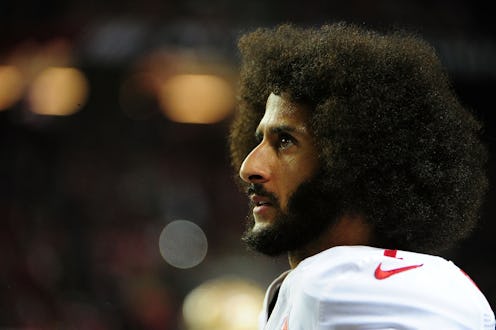
No one expected that Donald Trump's Friday night diatribe in Huntsville, Alabama, would bring African American football player Colin Kaepernick back into the boiling hot center of America's tumultuous conversation on race. While delivering a public speech to support Sen. Luther Strange in an upcoming primary election, Trump criticized Kaepernick for his political protest. Since that night, many have shown support for the football player, but as solidarity grows, it is important for white allies to remember the meaning of the take a knee protest Kaepernick started.
While speaking to a crowd, Trump said, "Wouldn’t you love to see one of these NFL owners when somebody disrespects our flag, to say, ‘get that son of a bitch off the field right now. He is fired. He’s fired!'" He went on, "You know, some owner is going to do that. He's going to say, 'That guy that disrespects our flag, he's fired.' And that owner — they don't know it, they're friends of mine — they'll be most popular person for a week."
Trump's comment was a not-so-veiled attack on Kaepernick, who has been protesting racial injustice and police brutality against black Americans since 2016. In August last year, Kaepernick did not stand for the American national anthem during the pre-game preparation.
In a bout of solidarity with Kaepernick after Friday night, many progressive white Americans have expressed that they will support him in taking the knee against Trump during the national anthem. While the sentiment is indeed appreciated, it is important for white allies to remember why Kaepernick is protesting to begin with. And that goes well beyond Trump.
In an interview with NFL Media in 2016, Kaepernick explained why he did not stand up:
I am not going to stand up to show pride in a flag for a country that oppresses black people and people of color. To me, this is bigger than football and it would be selfish on my part to look the other way. There are bodies in the street and people getting paid leave and getting away with murder
Progressive movements can, do, and should contain multiple and intersecting causes and goals. It is possible to be critical of Trump's decidedly vicious remarks against the football player while also remaining entirely mindful of the origin of his political protest. Kaepernick took a knee during the national anthem months before Trump became president of the United States.
Kaepernick's protest is against a form of violent racial inequality that predates the current president and is firmly embedded in the social fabric of this country in the form of discrimination against African Americans in education, professional places, and more.
Kaepernick isn't the first African-American athlete to protest compulsory patriotism and other forms of dogmatic thinking; Muhammad Ali, Tommie Smith, John Carlos, The Black 14, The Syracuse Eight, Serena Williams, St. Louis Rams, Miami Heat, Derrick Rose, and other black athletes and black teams have used their platforms to bring national attention to anti-blackness.
Remaining aware of the historical nature and root of a protest isn't binary-thinking or divisive. It is a critical component of progressive politics needed to bring different groups together for a common cause.
Omitting the primary reason why a human being is using their body to protest something is not only dishonest, it inadvertently exacerbates the very abysmal conditions such a person is speaking against.
Read more about Take A Knee
This One Chilling Photo Sums Up How Trump Feels About White Supremacists Vs. NFL Players
Trump's Kaepernick Comments Might Be A Diversion
Why Colin Kaepernick's Fans Are Protesting The NFL
This Tweet About Trump & The NFL Flawlessly Explains The Hypocrisy Behind It All